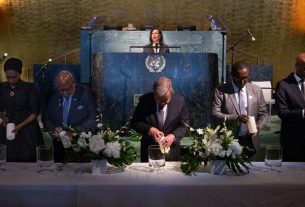|
Getting your Trinity Audio player ready...
|
A grave security threat, but not necessarily on par with the United States, European Union and China. That’s how some are describing Russia’s involvement on the continent. And it’s the question the South African Institute of International Affairs (SAIIA) wanted to answer with their latest journal, entitled Russia in Africa: Who’s Courting Whom?
This special issue explored Africa’s relationship with Russia from several perspectives and in the context of geopolitical developments, especially as the Russian war in Ukraine brings the country’s actions into sharp focus.
On publication, SAIIA organised a webinar bringing together researchers from across the world to discuss these developments with the journal’s authors and guest editors. Steven Gruzd, Cayley Clifford and Samuel Ramani.
The presentations made were based on empirical research in West Africa on the private military diplomacy of Russia in Africa, and the paper focused on what the authors called the collision across diplomacy, looking at the quest for influence through public diplomacy by Russia in Africa. They also considered targeted regional studies looking at the Horn of Africa and Southern Africa through different lenses.
The first panel, Dr Allard Duursma and Dr Niklas Masuhr, senior researchers at the Center for Security Studies at ETH Zurich, presented a paper entitled Russia’s Return to Africa in a Historical and Global Context: Anti-imperialism, Patronage, and Opportunism, while and Professor Bhaso Ndzendze presented A differentiated courtship: A regime-type analysis of Russia’s Southern African (arms) trade, 2012–2019, co-authored with Zimkhitha Manyana.
The paper by Drs Duursma and Masuhr focused on how mediation and peacekeeping can help to prevent armed conflicts with a regional focus on Africa studies, transnational dimensions of armed conflicts in Africa, as well as the involvement of Russia in Africa.
Duursma said the motivation for the paper is the ongoing debate about the extent of Russian involvement or some power projection in Africa. As evidence that Russia’s return to Africa is a grave security threat, former AFRICOM commander, General Stephen Townsend, referred to Russia’s malign influence in Africa as a second biggest threat to the U.S. security interest in Africa after terrorism.
But there are those that downplay the influence of Russia on Africa. The author and scholar specializing in international security, foreign policy, Russia, and environmental politics, Professor Kimberly Marten, argues that the extent of Russian influence in Africa is not that great in comparison to that of the United States, the European Union and China.
Russia has been involved elsewhere, and many observers note that their influence is quite small in Africa in comparison to the influence of Gulf States, for example. Undeniably Russia has returned to Africa recently, as seen in the various summits Moscow has organized, though the extent of their influence still remains doubtful and needs to be contextualized, the paper reads.
Future uncertainties, especially in relation to the war in Ukraine, are important to consider in evaluating which direction Russia is taking on the continent, the authors wrote. The debate contextualized Russian involvement in three steps. First, the Russian Soviet legacy and how this cashes in on this legacy, rulership architecture and a Nicholas the global context.
Southern Africa and the Soviet Union
In southern Africa, where you had still apartheid regimes, Russian support for the liberation movements was welcomed. And Russia, interestingly, really cashes in on this legacy. So this is why Russia is able to punch above its weight and does so consciously. Several series of documents were leaked, Dr Duursma said.
He referred to The Guardian article published in June 2019 where these leaked documents were discussed.
These included a paper titled ‘African World’ and dated March 2018, which calls for Russian support to develop an ‘African self-identity’ based on anti-imperialism, an integral part of the pan-African school of thought. In other words, it is in Moscow’s interest to promote this ideology, as anti-Western sentiments are virtually baked into it by way of anti-colonialism and anti-imperialism. The ‘African World’ paper suggests that Russia should actively work towards a ‘loyal chain of representatives across Africa, Dr Duursma and Masuhr’s paper reads.
“But there are two difference between the Soviet and Russian involvement in Africa that are worth stressing. During the Cold War, Russia really focused on countries or states where the West also had strong interest, for example, Angola.
“It seems that the return of Russia is more pragmatic. It now seeks to focus more on countries that are ignored by the West, for example, the Central African Republic and perhaps Mali is an exception in this regard. There are rumors that the Russian Wagner group has provided arms and has been heavily involved in Mali, but maybe there are also rumours that it is withdrawing because they are needed in Ukraine. But it is clear hat there is a much less state centric approach to Russian enforcement,” Duursma said during his presentation.
The authors also argue in the article that Russia’s use of patronage-based strategy is really a natural fit to gain influence in Africa. Duursma cited Alex Duvall’s work on Sudan, where he describes the UN as a political marketplace, in which local elites seek to obtain the highest rewards for their loyalty within these patronage-based systems.
Then Marie Israel Sahar and Delphine Michela’s reflections on how elites in Central African Republic have consistently used all means at their disposal to buy the loyalty of potential rivals. Dr Duursma said there is a strong pattern that shows there is patronage in Africa.
While Moscow is often viewed as a monolithic, holistically thinking and executive actor, the reality is much more ambiguous. This is related to what has been described as a ‘solar system’ in which the power of is defined by their proximity to President Vladimir Putin.
In this view, the Russian ruling circle is a highly complex network of oligarchic and administrative actors, which also includes those in charge of the military security complex (siloviki).
This makes it very compatible with doing business in in Central African Republic, Sudan, Libya, Zimbabwe. Russian related actors within this broader patronage network, do business as they see it as this really makes it a natural fit. In Central African Republic, Russian actors are active in the mining industry which is seen as semi State deals (( A deal between private entities and the State) Dr Duursma argues.
Russian activities on the ground in Africa actually run through semi-state networks. The so-called Wagner group is by far the most prominent one. Some of them may have less of a connection to the Kremlin than others. But what is clear is that they don’t act against Kremlin priorities. A lot of what they do is actually or we have to assume that the Kremlin has at least veto power and has the ability to conscript those mercenaries when it deems its of its strategic interest.
“But again, this is also one of the reasons why we’ve observed this Russian opportunism in Africa of going into the places where they’ve perceived a power vacuum,” Dr Duursma said.
“That’s also one approach that we’ve observed in all that can be observed in Syria and in Libya. And militarily speaking, one of its key components has been to use local proxies like militia local mercenaries, local irregular forces, in the case of Syrians, for instance, to do most of the fighting, whereas Russian special forces and Russian mercenaries have been doing training and coordination, backed up in Syria and Libya, of course, by Russian airpower. And one term that has been used to view Russia or through which Russian interventions can be viewed is this idea of reasonable sufficiency. In the West, it would be called or in Western military parlance, it would be called low cost high impact operations. And the idea really is for Russia to maximize strategic effects at as low cost as possible. And interestingly, that is a priority that can be observed in those semi state networks as well”.
“We’ve also got political and information operation components. Again, going back to Syria, as an example, what was observed, there were so called reconciliation centers that really acted like mediation cells, or like the West would use mediation cells for but in the Russian case, those while there was mediation going on, also, the cells were collecting human intelligence to feed into rational targeting cycles to then target Syrian opposition forces.
“And it could also be seen in the Central African Republic, for instance, and in Sudan, I think, what was the use of Information Operations specifically to move the to move online discourse in favour of Russia, where Russia really has capitalized on those narratives of being a non colonial power and on those those post Soviet legacies, in order to spread its narratives. And in the Central African Republic, of course, these paramilitary elements that have caught a lot of the attention are only one element in a broader political entrenchment campaign in favour of the incumbent president. So in that sense, this, again, also mirrors what the Russian or how the Russian military thinks it would conduct power projection in many ways,” said Dr Duursma.
“It can be or it can be assumed that certain areas in Africa will be of higher strategic relevance to the Kremlin than others. And in those areas, those semi state actors will have less autonomy, or the Kremlin will have a tight that will have tighter strategic control, presumably.
“Regardless of how strong Russia assumed to be or how relevant and how influential Russia is assumed to be in certain African African countries power projection for the Russians always has to be achieved at low cost. And that, of course will be will only be increasing with due to the fallout from the the invasion of Ukraine”.
“And regarding the future of this involvement, there really are two archetypes, if you will. One of them would be the idea that Russia now with this increased competition with NATO, or this increased rivalry with the West might militarize its footprint in Africa, and while still, presumably acting through mercenaries and other paramilitary group might increase strategic control and approach closer this model or this idea of a master plan. However, on the other hand, of course, it can be audited Russian resources will be hard pressed. For Russia, it may be increasingly difficult to to present itself as a not alternative but also competent power”.
“The Wagner group’s counterterrorism credentials, may not they are not very Stallard. That may be something a bit problematic for the Russians. And of course, there have been rumorus of mercenaries having to be redeployed to Ukraine. So that will likely really be a spectrum between those two priorities. And so far, it is too soon to tell,” the paper said.
(Part 2 follows next week with the perspective of co-author Dr Niklas Masuhr)



